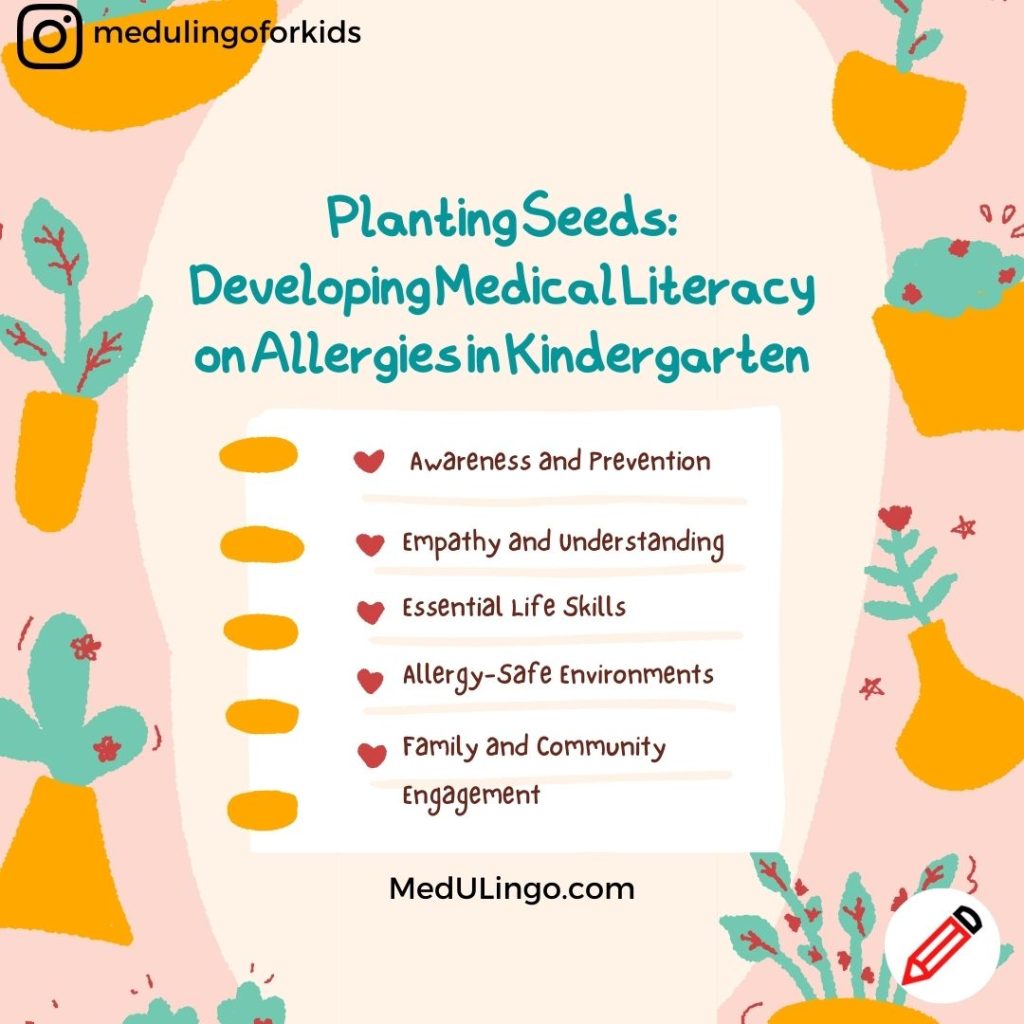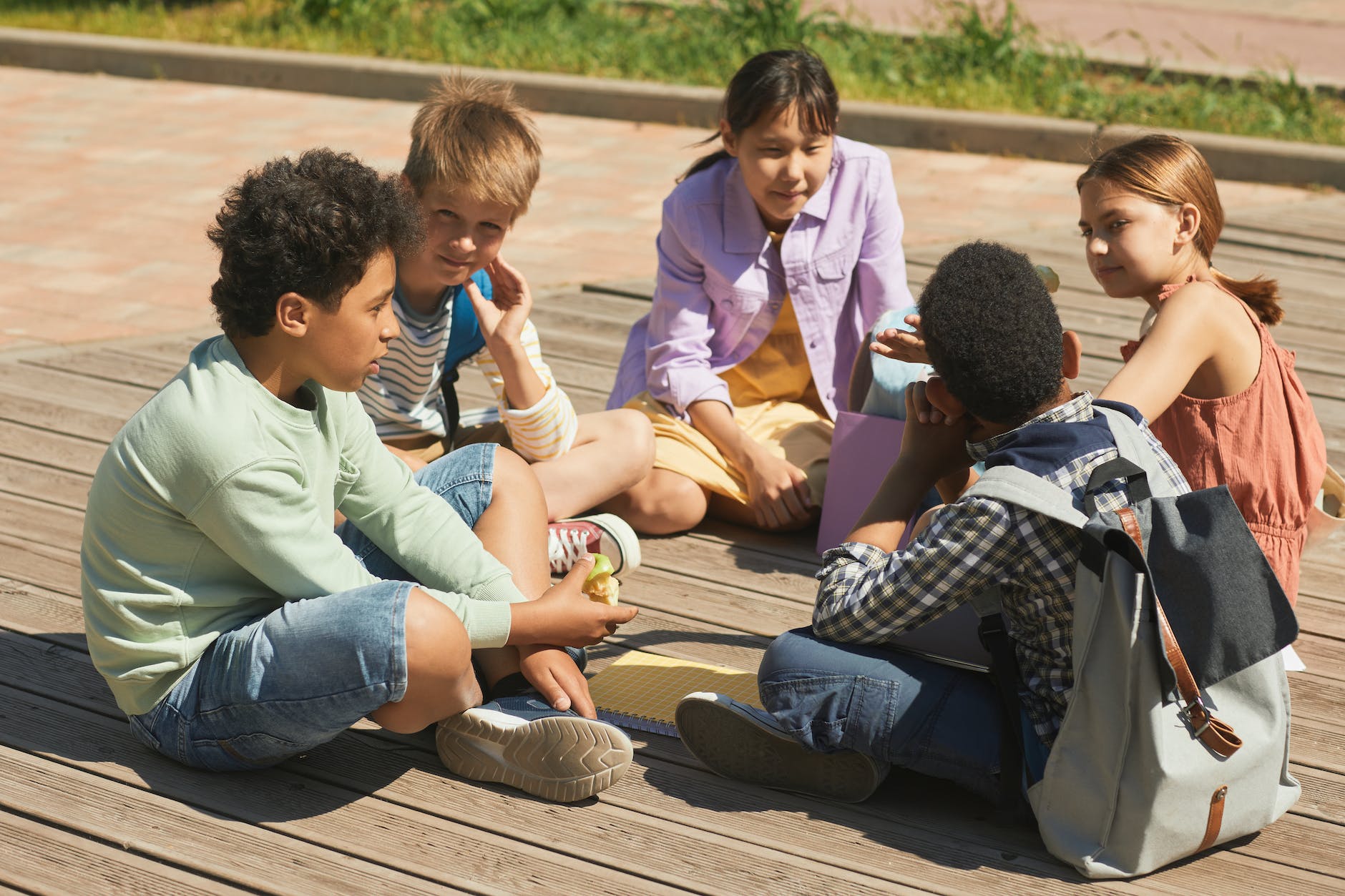In early childhood education, the importance of instilling medical literacy about allergies in kindergarten emerges as a critical step towards fostering a culture of health, safety, and inclusion. Allergies affect millions of individuals worldwide, spanning a spectrum of food, environmental, chemical, and medication-related sensitivities. By introducing age-appropriate allergy education and awareness initiatives from an early age with an activity book like A to Z Rare Allergies, educators lay the groundwork for promoting health literacy, empathy, and allergy management skills that can benefit children throughout their lives. Here’s why medical literacy instruction on allergies needs to start in kindergarten:

1. Early Awareness and Prevention:
Kindergarten marks the beginning of a child’s formal education journey, offering a prime opportunity to instill foundational habits of health and wellness. Introducing medical literacy about allergies from this early stage empowers children to recognize potential allergens, understand allergic reactions, and learn preventive measures. By incorporating age-appropriate discussions, storytelling, and visual aids, educators can help children identify common allergens, such as peanuts, dairy, fragrance, pollen, and pet dander, and develop strategies to avoid exposure. Early awareness and prevention play a crucial role in promoting safety and reducing the risk of allergic reactions among young children.
2. Fostering Empathy and Understanding:
Medical literacy instruction on allergies in kindergarten fosters empathy and understanding towards children with allergies. Through storytelling, role-playing activities, and discussions, educators can create a supportive environment where children learn to recognize and respect each other’s differences. Teaching children about allergies helps demystify the condition and reduces stigma, allowing classmates to better understand and support their peers with allergies. By promoting empathy and inclusion, kindergarten classrooms become nurturing spaces where all children feel valued, respected, and understood.
3. Building Essential Life Skills:
Developing medical literacy about allergies from kindergarten equips children with essential life skills for managing allergies and advocating for their health needs. Educators can teach children how to recognize allergic symptoms, seek help when experiencing a reaction, and communicate their allergies to caregivers and teachers. Additionally, children can learn about basic first aid techniques, such as using an epinephrine auto-injector, in case of severe allergic reactions. By empowering children with practical skills and knowledge, educators help instill confidence in managing allergies throughout their lives.
4. Creating Allergy-Safe Environments:
Starting medical literacy instruction on allergies in kindergarten promotes the creation of allergy-safe environments in schools and communities. Educators can collaborate with school administrators, parents, and healthcare professionals to develop allergy-friendly policies, such as nut-free classrooms, allergen-free lunch tables, and emergency action plans for allergic reactions. By raising awareness and implementing safety measures, schools can minimize the risk of allergic incidents and ensure that children with allergies feel supported, included, and protected in their learning environments.
5. Encouraging Family and Community Engagement:
Medical literacy instruction on allergies in kindergarten encourages family and community engagement in promoting allergy awareness and safety. Educators can involve parents, caregivers, and community members in allergy education initiatives, such as allergy awareness workshops, school assemblies, and community health fairs. By fostering collaboration and shared responsibility, schools and communities can work together to advocate for allergy-friendly policies and practices that prioritize the health and well-being of all children. Family and community engagement play a vital role in creating a supportive ecosystem where children with allergies can thrive and succeed.
Develop Medical Literacy on Allergies in Children
In conclusion, the case for starting medical literacy instruction on allergies in kindergarten with a resource like A to Z Rare Allergies is clear: early education and awareness are key to promoting health, safety, and inclusion for all children. By empowering young learners with essential knowledge, skills, and attitudes about allergies, educators lay the foundation for a future where allergies are understood, accommodated, and respected. Through collaboration, empathy, and education, we can create allergy-safe environments where every child feels valued, supported, and included in their school and community.
As we embark on this journey of allergy education and awareness, let us embrace the transformative power of medical literacy in kindergarten, nurturing a generation of compassionate, informed, and allergy-conscious global citizens. Together, we can create a world where allergies are no longer barriers but opportunities for understanding, empathy, and shared support.
===
Interested in teaching medical literacy pain free? Shop medical literacy resources!

This article was drafted by ChatGPT and edited by Joan Lee Tu, the founder of MedULingo.com.
You may also be interested in the following articles:
Clinical Reasoning in Grade Three with A-to-Z Medical History and Histology Lessons
How to Accommodate People with Chemical Allergies
Preventing Contact Allergies in Kids: A Guide for Parents – FREE DOWNLOAD
Consumer Literacy Scavenger Hunts – FREE DOWNLOAD
Eczema: The Contact Allergy Booklet
The Green Soap Girl and the Itchy Allergy
The Green Soap Girl Goes to the Beach
A to Z Medical Literacy: Childhood Rashes
A to Z Medical Literacy: Rare Allergies
Cultivating Allergy Awareness from Kindergarten with Medical Literacy
Planting Seeds: The Case for Developing Medical Literacy on Allergies in Kindergarten
The Benefits of Developing Medical Literacy About Dermatitis from Kindergarten
Planting Seeds: The Case for Medical Literacy on Dermatitis from Kindergarten
Safe Science: Guidelines for Handling Chemicals in Kids’ Science Activities
Safeguarding STEM Learning: Best Practices for Sanitizing LEGO in Education Programs
The Great Debate: Soap vs. Sanitizer in STEM Education Programs

